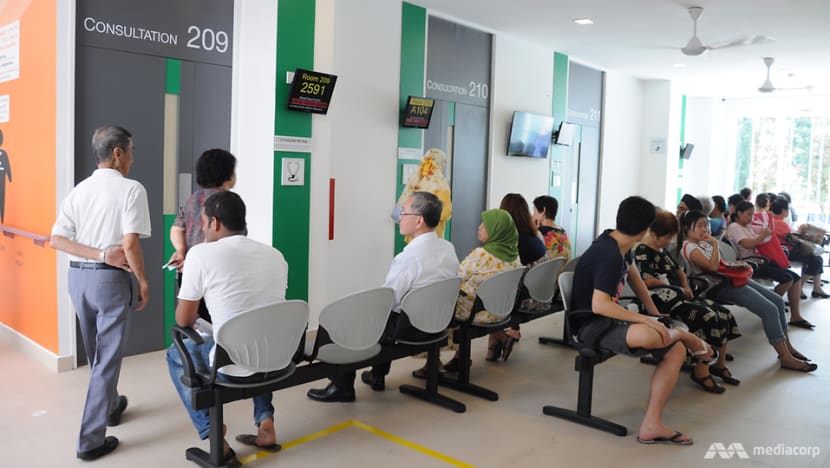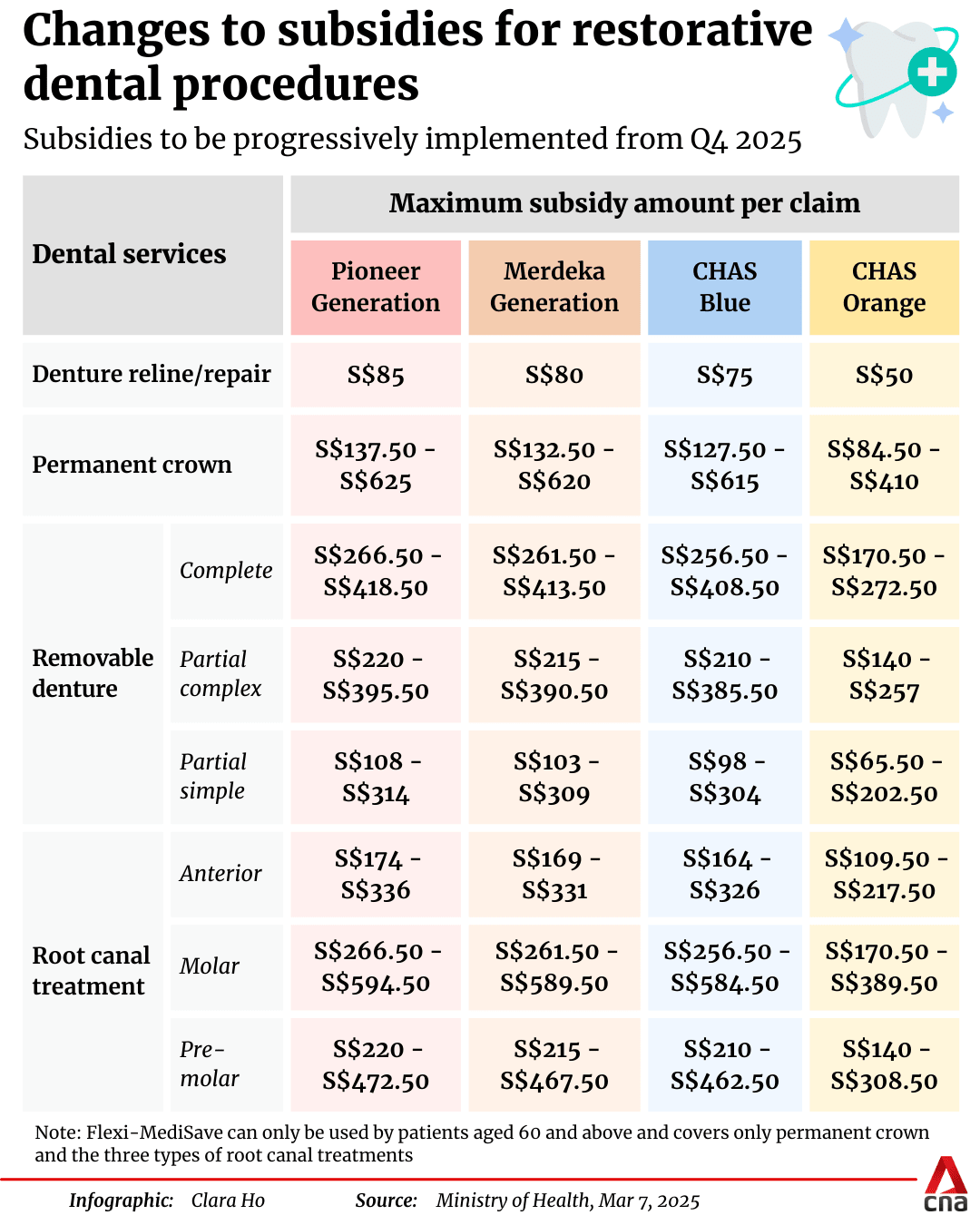MediSave withdrawal limits to be raised for some outpatient bills
From mid-2026, seniors will be able to use their MediSave to pay for root canal treatments and permanent crowns at CHAS dental clinics and public healthcare institutions.

Patients at a polyclinic in Singapore. (File photo: Try Sutrisno Foo)

This audio is generated by an AI tool.
SINGAPORE: Singaporeans and permanent residents will be able to use more of their MediSave to reduce their out-of-pocket expenses at healthcare providers.
Currently, Singaporeans and PRs aged 60 and above can use up to S$300 (US$225) annually under the Flexi-MediSave scheme to pay for outpatient medical treatment at polyclinics, public specialist outpatient clinics and Community Health Assist Scheme (CHAS) clinics.
From Oct 1, this limit will be raised to S$400 annually, the Ministry of Health (MOH) said on Friday (Mar 7).
For outpatient scans, including magnetic resonance imaging (MRI) and computerised tomography (CT) scans, the MediSave withdrawal limit will be doubled from S$300 to S$600 from 2026 for all Singaporeans and PRs.
These changes are expected to benefit more than 500,000 patients who use MediSave for outpatient scans each year, and around 700,000 seniors who tap on Flexi-MediSave.
These announcements were made by Health Minister Ong Ye Kung on Friday as he laid out his ministry's spending plans for the year.
Responding to Leader of the Opposition Pritam Singh's criticism of the government's poor "budget marksmanship", Mr Ong defended the recent Goods and Services Tax (GST) increase.
"We need the additional GST revenue, paid for mostly by those who are better off, foreigners and tourists, to continue to support universal and affordable healthcare for Singaporeans. The support given in healthcare is practically all structural, instead of vouchers," said Mr Ong.
"We can argue about the perfect timing for raising tax revenues. However, if we do not raise the revenue in time while the population ages and healthcare expenditure escalates, we won’t be debating budget marksmanship then.
"There wouldn’t even be a balanced budget target board to aim for, as our fiscal position will be deep in the red."
Mr Ong said that this year’s healthcare budget is S$21 billion. By 2030, it is estimated to be over S$30 billion.
He points out that the 2 percentage point increase in GST yields around S$5 billion more in revenue.
MORE DENTAL SUBSIDIES
The ministry also plans to improve access to dental care by raising subsidy limits and allowing the use of Flexi-MediSave for some dental procedures, including root canal treatments.
Mr Ong said that there is a longstanding collaboration between schools and MOH to protect the teeth of the young, but oral health deteriorates in adulthood.
A person needs at least 20 natural teeth to chew effectively. However, only 56 per cent of people aged 55 and above in Singapore have 20 or more natural teeth – compared to the full set of 32 teeth.
The health minister said that he has met many residents who chose to extract a decayed tooth rather than go through a root canal, as extraction is cheaper and easier to do.
"But this is penny wise and pound foolish. We will have fewer and fewer teeth as we grow old if we take this approach. This diminishes our ability to chew effectively, and in our old age affects our nutritional intake," he said.
To improve oral health, subsidy limits will be raised for seven types of restorative dental treatments for lower-income families and those in the Pioneer and Merdeka generations, who are Singaporeans born before 1960.

CHAS Orange cardholders – households earning between S$1,501 and S$2,300 a month – will now qualify for dental subsidies for 10 basic and preventive procedures, such as scaling and polishing.
Currently, these subsidies are only available to CHAS Blue cardholders – households earning S$1,500 and below – and Pioneer and Merdeka generation seniors.
From mid-2026, seniors will be able to use Flexi-MediSave to pay for root canal treatments and permanent crowns at CHAS dental clinics and public healthcare institutions.
MOH will also introduce fee benchmarks for common dental procedures in both public and private clinics by the fourth quarter of this year to enhance cost transparency.
Mr Ong said: "When subsidy goes up, we must prevent some providers from raising prices sharply and creaming off the subsidy. We will therefore have to strengthen governance and prevent abuse by introducing fee benchmarks for common dental procedures."
Senior Minister of State for Health Janil Puthucheary also announced that MOH is planning to consolidate the public healthcare clinical apps so patients can access services on a unified platform.
Currently, there is a Health Hub app and a number of different apps for healthcare clusters including Health Buddy, NHG Cares and NUHS. He said that they will be integrated into a unified platform by 2027.
"We will consider adding Healthy 365 to the unified platform in the future," said Dr Puthucheary.
FERTILITY TREATMENT BOOST
Cancer patients undergoing chemotherapy and radiotherapy will receive additional financial support for fertility preservation procedures such as embryo, egg and sperm freezing.
These treatments, which can cause irreversible infertility, offer patients hope of having children in the future.
From June, eligible patients will receive means-tested subsidies of up to 80 per cent, with more details to be announced later.
From June next year, MediShield Life will cover surgical procedures for egg and embryo freezing, and patients can use MediSave for more of the costs incurred.
"Those who still face challenges with the cost of their fertility preservation treatments arising from medically necessary treatments may also approach medical social workers at their public healthcare institutions for further assistance, including to apply for MediFund," said Minister of State for Health Rahayu Mahzam.
"With these changes, we hope to assure patients facing medical challenges that their dreams of starting a family in the future are still within reach."
MOH is also adding three more drugs to lists of subsidised chronic medications. These are Evolocumab, which is for high cholesterol, and two drugs for blood sugar control: Humalog Mix25 and Humalog Mix50 Kwikpens.














